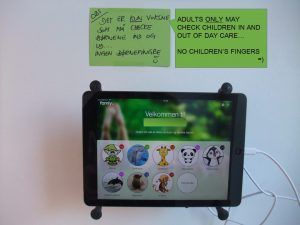 What are the psychological and ethical implications of digitalising daycare institutions, in particular for children’s, parents’ and other educators’ self-understanding and conduct of everyday life? How are relational notions of caretaking, of development, and of learning, changing alongside increasing reliance on digital interfaces for both administrative and pedagogical purposes in Early Childhood Education and Care? Social psychologist Niklas A. Chimirri (Roskilde University), member of the Danish Centre for Research in Early Childhood Education and Care, explores these questions by contrasting research in German and Danish daycare centres.
What are the psychological and ethical implications of digitalising daycare institutions, in particular for children’s, parents’ and other educators’ self-understanding and conduct of everyday life? How are relational notions of caretaking, of development, and of learning, changing alongside increasing reliance on digital interfaces for both administrative and pedagogical purposes in Early Childhood Education and Care? Social psychologist Niklas A. Chimirri (Roskilde University), member of the Danish Centre for Research in Early Childhood Education and Care, explores these questions by contrasting research in German and Danish daycare centres.
During my long-term participant observations in daycare institutions in Germany and Denmark, parents and early childhood educators were well aware of the fact that they need to prepare children for an increasingly digitalised world. Or to be more precise: most of them have been agonising over how to best help their children in doing so, given the ambiguous information that they had read or heard. Their approaches on how to best help children were accordingly inconsistent: parents and educators expressed forms of digital resistance and avoidance, and wanted their children to at least experience a media-free environment at the daycare; but parents and educators also expressed different ways of actively engaging in children’s development of digital literacy, for instance by what can be termed ‘collaborating’ or ‘cheerleading’. Or sometimes, they just wanted to ‘babysit’ or ‘supervise’ children’s digital activities.
Meanwhile, the adults were never either/or, pro or contra a development of digital literacy that also actively involved themselves – but they were unsure how to position themselves in relation to it. Here are some contradictory statements from the Danish and German parents I talked to, some of them expressed by the same parents, but in different situations:
- “Good that my son watches YouTube cartoons in Russian – perhaps he learns the language”
- “Our daughter should not be tainted by digital media at daycare: she watches enough at home”
- “My son is not to visit his friend at home: the friend and his brother’s film and computer game consumption could be detrimental for his development”
- “I do not understand the media references our children nowadays relate to: it is too much of a hassle to keep up with the current trends, although it would be important to know”

Ambiguous adult roles in digital literacy promotion point to the relative usefulness of digitalisation
All the adults I talked to, especially the parents, were similarly wavering between what adult roles and responsibilities to assume in promoting digital literacy, what to promote and what to limit – depending on the specific context they were in, how they and their child were doing, their family, or whether they were talking to a parent, an educator, a child, or a researcher. This indicates the ambiguity of parental and other adult roles in public discourses on digital literacy, and how such discourse creates uncertainty among many.
And yet, my analysis highlights that it is precisely this ambiguity and uncertainty that is a prerequisite for more democratic engagements with digital tools across age groups. They highlight that child carers sense that digital tools cannot be understood and used in only one way, and that there are no quick-fix solutions to promoting digital literacy at home or in daycare. This also implies that it is important to examine a parent’s or an educator’s role in context. However, parents’ sense or tacit knowledge of digital technology, as well as life’s context-dependent ambiguities is commonly not regarded as valid knowledge for the promotion of digital literacy.
Must the digitalisation of Early Childhood Education and Care be a priority? Doubts spur protests in Denmark
Denmark has been known for its high acceptance of technology-welcoming discourses. In 2014, a report commissioned by the Danish Agency for Digitisation under the Ministry of Finance asserted that “digital media came to stay” in Early Childhood Education and Care institutions. By 2017, up to 65% of all Danish day care centres used digital tools in their pedagogical work with children at least once a week. The latest digital communication tool, Aula, commissioned by the municipalities association Local Government Denmark, will be adopted by almost every Danish municipality in 2020 and collect teacher-parental communication all the way from the crèche to 9th grade.In contrast, digitalised day care institutions remain an experimental exception in Germany, merely tested more systematically in a few federal regions.
However, the prediction that digital media is here to stay should not have been made without taking parents’, educators’, and children’s interests and challenges into account. Protests in April 2019 indicated that parents and educators of young children do not simply listen to policies. The protests followed a TV documentary about decreasing quality in Danish daycare centres. Declining educator/child ratios, coupled with increasing documentation, communication and teaching duties, supposedly rendered more efficient via digital tools, had put pressure on what the educators consider to be their core tasks.
Democratic explorations of a digital conduct of everyday life with young children
The protests were successful in that they influenced the new government’s state budget negotiations, a budget that promises minimum educator/child ratios by 2025. This underlines that in democratic societies, parents of young children play a decisive role in making a digitalised day care institution a reality or not – and are therefore heavily and ambiguously targeted by European Union and policy-makers, for instance via digital literacy campaigns, as well as by companies. Meanwhile, parents who have been made primarily responsible for digital literacy feel they are left alone navigating through these ambiguities. Early Childhood educators also have few resources left to discuss pedagogy with parents, and to give them a comprehensive insight into the child’s everyday life at the day care.
Recommendations
The current prescriptive, instrumental nature of public information on digital literacy for children creates confusion and helplessness among both parents and educators. Once they start thinking of themselves as ‘experts’ in digital technology they cease to explore these complex questions together with their children and other adults. Therefore I recommend:
Do not prescribe specific digital tools to Early Childhood institutions: the educators need to be able to find those that are most relevant to the respective pedagogic practice. The diversity of pedagogical approaches, given the diversity of children and parents they encounter, needs to be mirrored by a diversity of digital tools.
Underline that digital tools are intended to be tools to facilitate and enrich analogue experience. Accordingly, the relevance of digital tools depends on the personal and collective engagements of children in their everyday world.
Support the promotion of digital media literacy of educators and parents by providing specialised pedagogical staff, which act as publicly funded, local/regional counsellors and intergenerational mediators that are independent of party-political and industry interests.
Make sure that digital engagements and learning do not replace any of the fundamental analogue tasks that Early Childhood educators are to fulfil: caretaking, engaging in playing and other multimodal pedagogical activities, including touching base with the parents about their daily struggles. Additional tasks require additional resources, and the digitalisation of Early Childhood Education and Care should not be at the financial and thereby temporal detriment of any analogue activity.
Notes
This blog post builds on a recently published anthology chapter (openly accessible from January 2020).
This article represents the views of the author, and not the position of the Parenting for a Digital Future blog, nor of the London School of Economics and Political Science.





